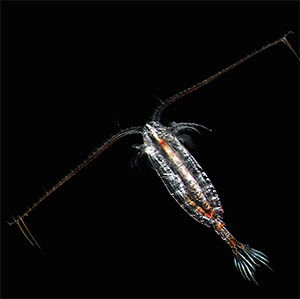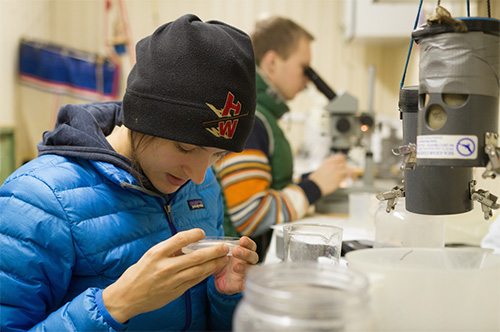
Chukchi Sea plankton communities thrive in warmer waterBy LAUREN FRISCH
April 16, 2016
Elizaveta Ershova, a PhD student at the UAF School of Fisheries and Ocean Sciences, is working with SFOS biological oceanography professor Russell Hopcroft to understand distribution and change in zooplankton communities in the Chukchi Sea, and how zooplankton respond to changes in ocean temperature. Zooplankton organisms are an important source of food for animals higher up in the food chain, including fish, birds and marine mammals. They drift in the ocean currents and feed on phytoplankton, the tiny algae that photosynthesize to make their own food. “Zooplankton are abundant in the Chukchi, and connect the lowest tropic levels of phytoplankton to the fish, birds and mammals that’ll eventually eat the zooplankton,” Ershova explained. Ershova is part of the Russian American Long-Term Census of the Arctic, or RUSALCA program, one of the only comprehensive studies looking at the oceanography of both Russian and US Chukchi waters. “There are no borders for the currents or communities in the Chukchi, so it’s important to sample the whole area,” she said. Originally from Moscow, Russia, Ershova has lived in both Russia and the United States. Now, she works jointly with SFOS and the Shirshov Institute of Oceanology in Moscow. She thrives on a project that requires understanding and working in both countries and cultures. “It’s great to have someone who has her foot in the door in both cultures and languages to help make the research straightforward,” Hopcroft said. “I don’t think I’m going to be able to hand this project off to another student to run with and know they’ll have the ability to operate in both countries the way that Liza has.”
Elizaveta Ershova picks plankton out of a sample to analyze while doing fieldwork in the Arctic Ocean.
Ershova joined the RUSALCA team as a technician in 2009, and decided to pursue a PhD to further study zooplankton distribution the following year. “We were so impressed with Liza on that cruise that we redid the budget to find a way to continue to support her,” Hopcroft said. Ershova will be defending her dissertation at the end of March 2016. The RUSALCA program is funded by the National Oceanic and Atmospheric Administration. Ershova received additional support through the Encyclopedia of Life Fellowship, the SFOS Robert Byrd competition and the UAF Center for Global Change. Ershova found that the Chukchi Sea has distinct zooplankton communities whose distributions are shaped by currents and water masses. As a result, the composition of plankton can reveal the kind of water mass that is present in an area. “If someone comes to ask me if a water mass is from warm meltwater or Alaska coastal water, I can tell based on the composition of plankton. There are some species that can be found in one kind of water mass and nowhere else.” Because of this, Ershova said, “It’s very easy to tie my topic into a broader scale picture.” Additionally, she is comparing the modern distribution of plankton in the Chukchi to similar data records going back to the 1940s to determine if there has been a change in biomass of plankton over time. This was challenging, as the historic data included different sampling, processing and calculation methods. But the trends in the data were still clear. “Even when you cut away everything that doesn’t fit into the main scheme, we still saw a very significant increase in the biomass of zooplankton in the Chukchi,” Ershova said. More warm water is flowing into the Chukchi from the Bering Sea, resulting in earlier ice-free periods and longer summer seasons. These conditions may allow zooplankton to thrive in Chukchi waters relative to what was possible 70 years ago. The inflow of water also carries Bering Sea plankton into the Chukchi, which could be responsible for some of the increase in biomass. Ershova is also studying reproduction of copepods—tiny crustaceans that are the most abundant type of zooplankton—in warm and cold ocean water. The two warm-water species she studied had high rates of reproduction and egg survival in cold water, which, Ershova explained, is probably why we see them up here. Conversely, one of the arctic species had more difficulty reproducing in warmer water. “It looks like during the summer the environment is getting more beneficial for the warm-water species and less beneficial for cold-water species,” she said. This project provides a long-term perspective on a community of plankton that is difficult to achieve. “It sounds easy to be able to say if things are changing as a result of warming; in practice it’s very hard because most time series are too short and the data are too noisy to be clear that you’ve got a signal,” Hopcroft said. Ershova and Hopcroft stressed that continuing this research, and expanding the time series, is important as we learn about how the ecosystem is responding to changes in ocean temperature. “It’s important to continue monitoring both US and Russian waters to keep watching what’s happening in the Chukchi,” said Ershova. “We’re seeing a system change. It’s in the process of changing right now, and it is critical that we continue to study it.”
This article is provided as a public service by the University of Alaska School of Fisheries and Ocean Sciences. Representations of fact and opinions in comments posted below are solely those of the individual posters and do not represent the opinions of Sitnews.
|
|||

